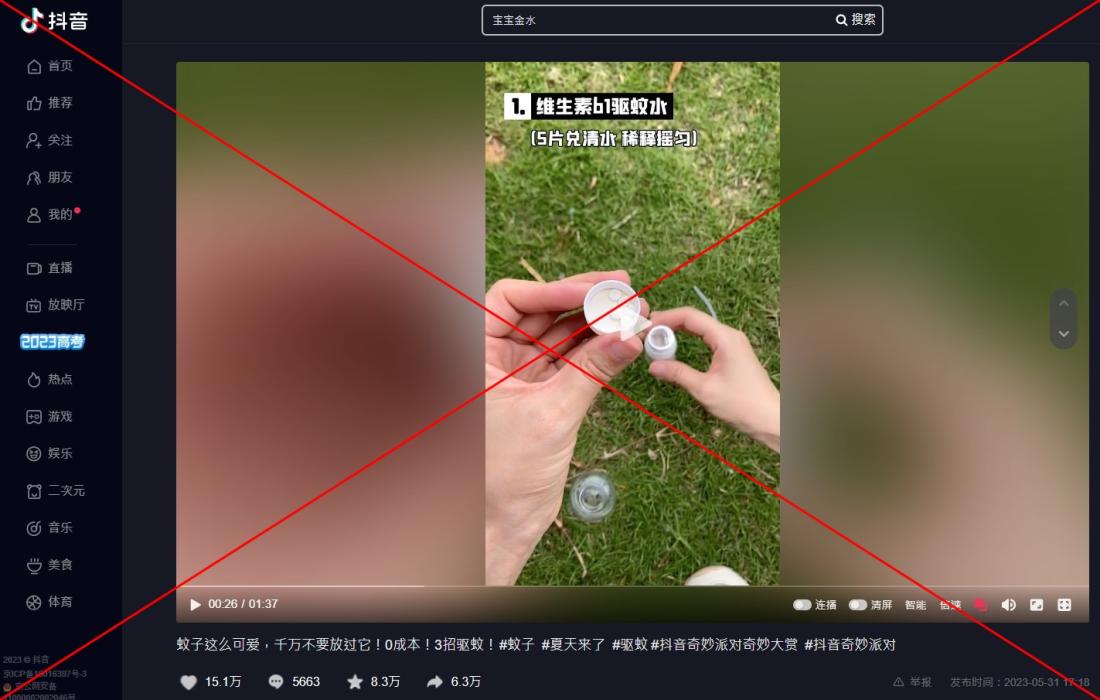
Homemade vitamin B1 spray is 'worthless' mosquito repellent: experts
- This article is more than two years old.
- Published on June 28, 2023 at 07:36
- 2 min read
- By Tommy WANG, AFP Hong Kong
"Take 5 tablets of vitamin B1 and water to dilute and dissolve, and then spray on the body to repel mosquitoes," a woman narrates in a video shared on Douyin, the Chinese version of TikTok.
"This is because mosquitoes are especially afraid of the smell of vitamin B1, but people do not feel it," she goes on to say.
The video has been shared more than 63,000 times since it was uploaded on May 31.

The World Health Organization warned in April that climate change was accelerating the spread of dengue and other mosquito-borne diseases, and that global outbreaks could be imminent.
Similar claims touting vitamin B1 -- also called thiamine -- as a mosquito repellent have also been shared in articles on Chinese websites Zhihu and social media app Xiaohongshu.
Thiamine dietary supplements are widely available without a prescription and come in tablet, capsule and liquid forms.
The vitamin plays a vital role in the growth and function of the body's cells but cannot be used to prevent mosquito bites, a scholar who studies mosquitoes and disease experts separately told AFP.
'Worthless' repellent
"The use of thiamine as a mosquito repellent has been extensively tested on humans and animals for over 80 years, and it simply doesn't work," Matan Shelomi, an associate professor of entomology at National Taiwan University, told AFP on June 27.
"[You could] bathe in thiamine water, but you'd still be bitten by mosquitoes," he added. "It's worthless as a repellent, but myths never die."
A scientific literature review authored by Shelomi and published in February 2022 in the Bulletin of Entomological Research screened 49 papers, 16 insect bite prevention guidelines and four government documents (archived link).
It found none of the reviewed materials reported the protective effect of vitamin B1 against mosquito bites.
Ineffective protection leaves people open to mosquito bites, putting them at risk for diseases such as malaria, dengue fever or zika virus, Shelomi said (archived links here, here and here).
"Mosquitoes transmitting dengue are active during the day. However, like other vitamins, vitamin B1 is very sensitive to daylight," Donal Bisanzio, a senior epidemiologist at nonprofit scientific research organisation Research Triangle Institute told AFP on June 24.
"Thus, when the vitamin B1 is diluted in a solution, it is rapidly degraded by sunlight after being sprayed."
"Mosquito-borne diseases are very serious and real threat," Daniel Markowski, a technical adviser at the American Mosquito Control Association, told AFP on June 27, 2023.
Markowski and other experts have pointed out that people can use repellents with effective ingredients recognised by public health agencies to prevent mosquito bites (archived link).
These ingredients include DEET, picaridin and other compounds (archived links here and here).
Copyright © AFP 2017-2026. Any commercial use of this content requires a subscription. Click here to find out more.
Is there content that you would like AFP to fact-check? Get in touch.
Contact us
